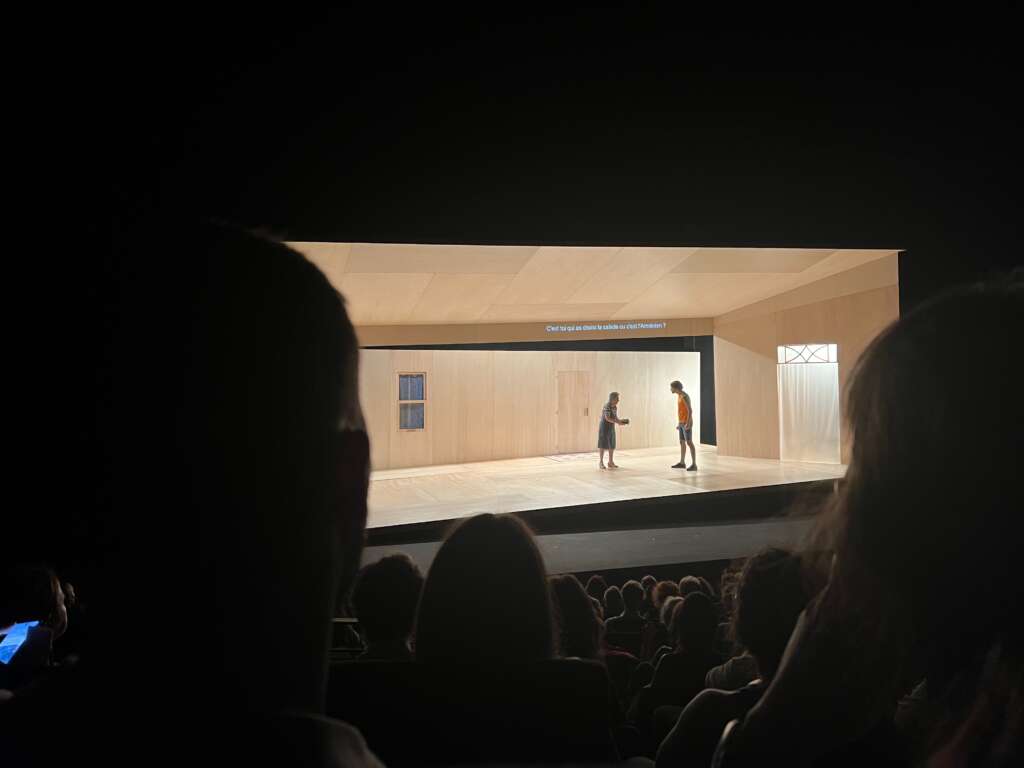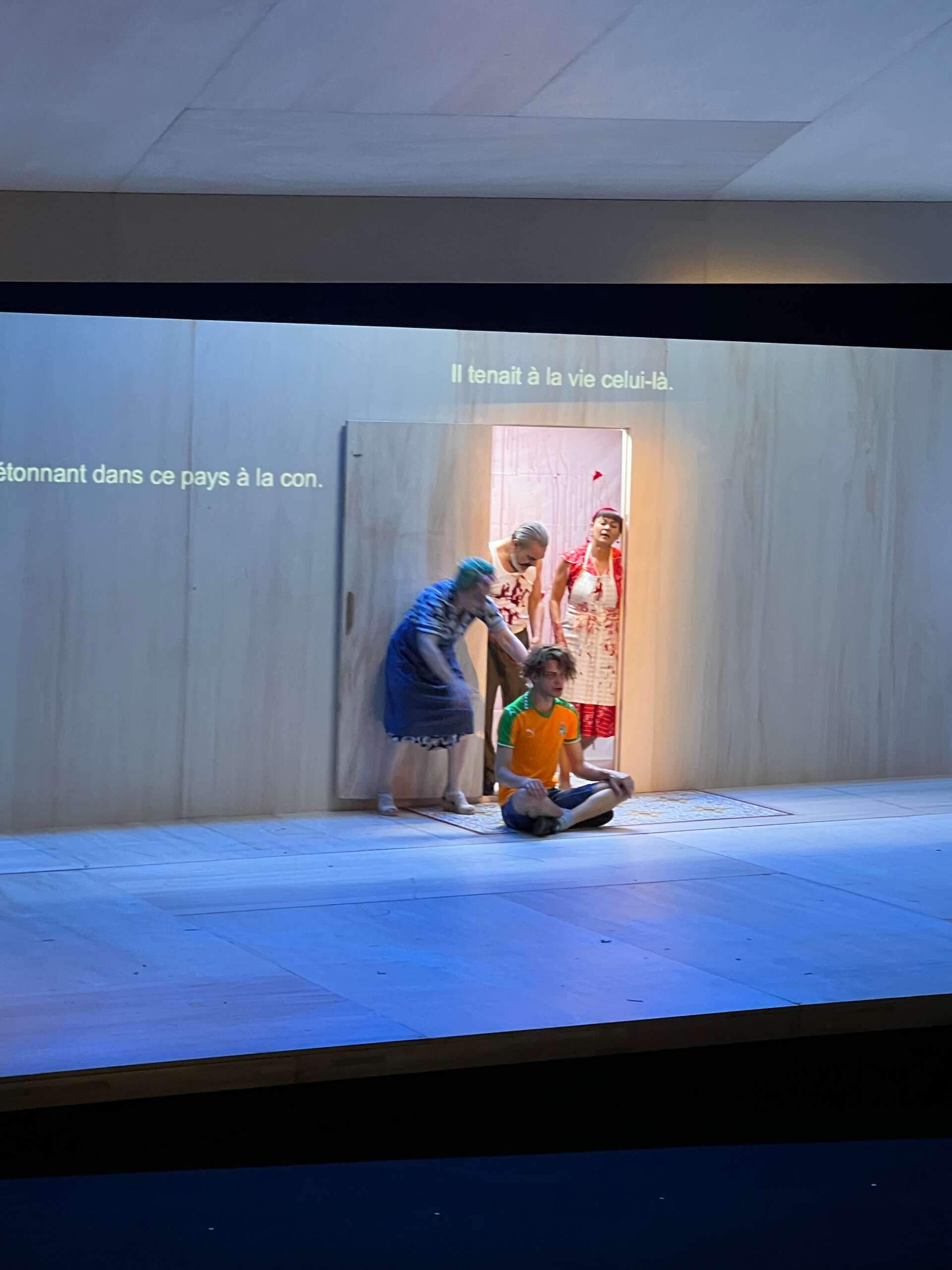From Rahbani’s aphorism to Mouawad’s absurd wedding, Lebanon’s stage insists on today when tomorrow never comes.
“There are two silences. One when no word is spoken. The other when perhaps a torrent of language is being employed. This speech is speaking of a language locked beneath it. That is its continual reference. The speech we hear is an indication of that which we don’t hear. It is a necessary avoidance, a violent, sly, anguished or mocking smoke screen.”
—Harold Pinter. Writing for the Theatre, The Tulane Drama Review, Vol. 6, No. 3 (March 1962), pp. 12–14.
Ziad Rahbani gave Lebanon its most enduring line: “They say tomorrow will be better, but what about today?” His death in July coincided with a revival of Wajdi Mouawad’s Journée de noces chez les Cromagnons in Paris, a crooked-house absurdity that seemed to stage the same question in architecture and ritual. Between Rahbani’s aphorism, Mouawad’s theatre, and Jan Patočka’s “solidarity of the shaken,” the present—shadowed by Gaza and renewed violence in Lebanon—becomes unbearable, and yet insists on being staged.
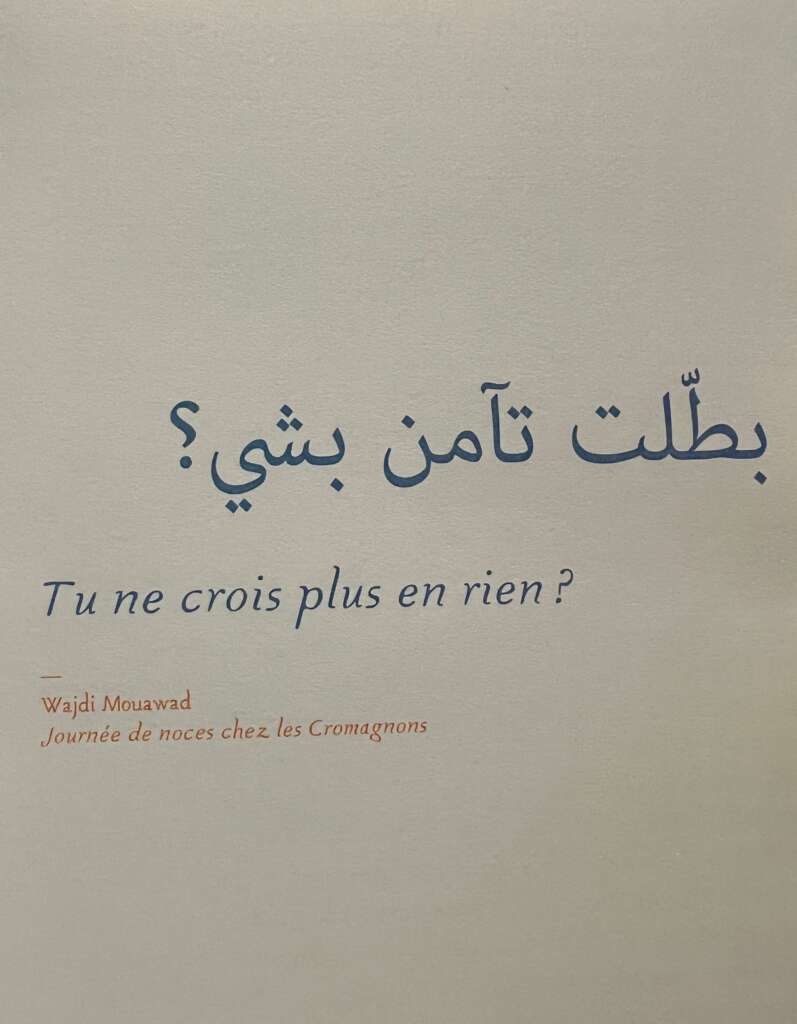
It is the most famous line in Lebanese theatre, and not because of clever writing or exquisite delivery, though both were true. It endured because it condensed a country’s condition into a single, weary shrug of a question. Ziad Rahbani gave the line to one of his characters in Belnesba Labokra Chou? (What About Tomorrow?) in 1978, and ever since, it has been repeated like a proverb, muttered like a curse, recalled like a scar. When Rahbani died this July at sixty-nine, the phrase came rushing back into circulation, quoted in headlines and WhatsApp messages, resurfacing like an unburied truth. It felt less like an elegy than a reminder, an aphorism that refused to stay in the past.
The plot of Belnesba Labokra Chou? was, by the standards of allegory, simple. A young man leaves his mountain village for Beirut, finds work in a bar, and struggles to survive. His wife, overwhelmed by the cost of living, turns to sex work. The marriage fails not because of infidelity but because of precarity, because the city refuses to forgive the poor. To watch the play then was to see private sorrow collapse into public tragedy: the story of a family dissolving into the story of a country lurching toward civil war. Beneath the colloquial humour and slapstick timing, Rahbani was staging a society unravelling in real time.
What distinguished him, and what I found myself recalling as the obituaries mounted, was not only his dramaturgy but his refusal to traffic in illusions. He was born into them: the son of Fairuz, Lebanon’s sainted voice, and Assi Rahbani, one half of the duo that conjured a cedar-scented Lebanon of song and myth. But Ziad inverted the inheritance. Where his parents offered postcards of the homeland, he dropped ashtrays on the table. His music was steeped in jazz and cabaret; his dialogue was in the Beiruti dialect, his wit was mordant. He wrote not of cedars but of unpaid rent, not of timeless landscapes but of shifting alliances. He did not so much mock Lebanon’s hypocrisies as make them speak.
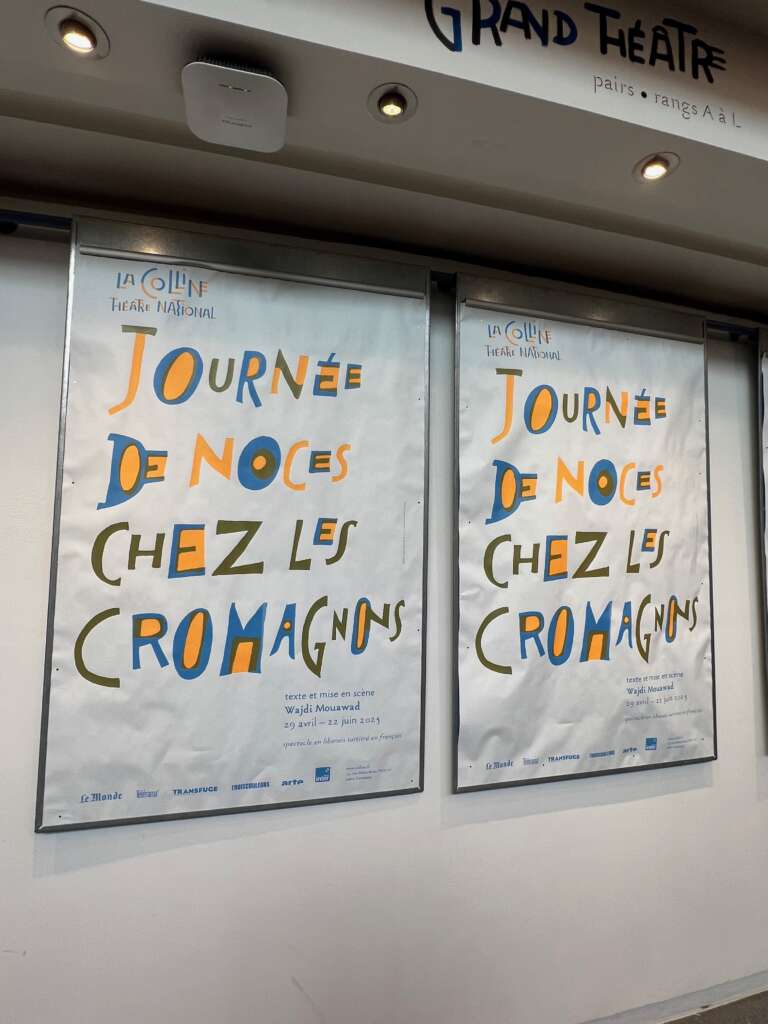
It is no accident that the line—what about today?—has survived him. It names the condition of deferred futures that still defines Lebanese life. Tomorrow is always promised: peace, reform, recovery. Today is always unbearable: queues at petrol stations, bombs overhead, leaders immovable. Rahbani gave the contradiction its most durable phrasing.
The Crooked Furniture of Hope
I thought of it again this mid-June in Paris, sitting in the Théâtre de la Colline, watching Wajdi Mouawad’s Journée de noces chez les Cromagnons. The play, written in the 1990s, had been revived with Mouawad himself directing. On stage was a Lebanese apartment that refused to stand straight. Emmanuel Clolus’s set was crooked: floorboards tilting, walls warped, furniture wobbling. At first, it seemed a trick of design, but after a few minutes, you realised the slanting angles were structural. Nothing in the house could hold steady. The actors compensated for their gait, half-balancing against gravity, as chairs slid out from under them and crockery threatened to fall. The very act of walking became precarious. The house was not the background but the protagonist, conspiring against its own inhabitants.
It was hard not to think of Rahbani. Where his aphorism made the unbearable present into speech, Mouawad here gave it architecture. A house that cannot stand is the material answer to the question: What about today? The audience laughed at first at the physical comedy—the uncle tripping, the bride stumbling—but the laughter soon turned nervous. The crooked house never righted itself. The joke was permanent.
The plot is grotesque. A family insists on staging a wedding in wartime Beirut. There is no groom, no electricity, no safety, yet the ritual must continue. The mother, half-deranged with determination, orchestrates preparations while bombardments echo outside. A sheep is dragged in, stuffed in a filthy sack, and intended as the centrepiece of the feast. It stinks of decay before the meal can begin, parodying the very idea of celebration. And at the centre is the bride, fragile, luminous, narcoleptic. Mid-scene, she collapses into sleep, as if time itself had short-circuited. “Narcolepsy is a gift of God in a country at war,” a character remarks, and the audience laughs uneasily. To bless unconsciousness as divine is the blackest of jokes, but one entirely intelligible to anyone who has lived through bombardment.
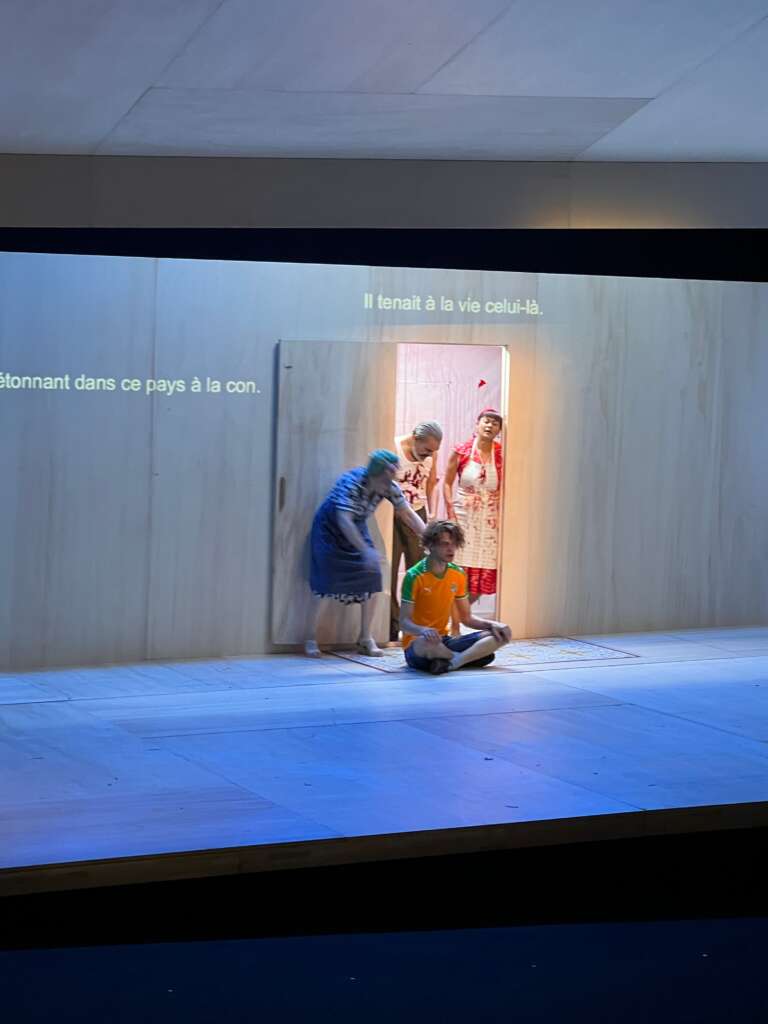
But everyone on stage, and off, is just as absurdly alive, waiting their turn.
Language itself was part of the drama. Performed in Lebanese Arabic, the play carried subtitles in French projected above. The delay was sometimes only a second or two, but it was enough to fracture the flow of time. The Arabic was earthy, colloquial, and immediate; the French was abstract and belated. Francophone audiences laughed on a slight lag, their comprehension deferred. Meaning was displaced, crooked, never quite synchronous. For me, fluent in the cadence of the Arabic, the subtitles served less as translation than as commentary—another crooked layer imposed on an already tilting house.
The soundscape completed the disorientation. Bombs fell offstage, irregular, refusing the audience the comfort of pattern. Silence was punctuated not at climaxes but at random. You could never settle. I realised, about halfway through, that the sound was not just a dramatic effect but a temporal strategy: to put the audience in the condition of waiting for the next strike, never knowing when it might arrive. In other words, to put them in the condition of Lebanon.
Outside the theatre, on the streets of Paris, the news was of Gaza. Entire neighbourhoods flattened. Children killed in UN schools. In the south of Lebanon, Israeli strikes are once again pushing villagers into flight. To sit in the Colline, watching a crooked Lebanese house stage an absurd wedding, was to feel a double time: the allegory of the past collapsing into the immediacy of the present. I could not separate the bride’s collapse from the images of Gaza’s hospitals. The sheep dragged in as a feast was indistinguishable from the carcasses shown on evening broadcasts. The theatre refused to remain a metaphor; it was always also a form of documentation.
A Sheep in a Sack, a Bride on the Floor
The French critics compared the play to those of Ionesco and Beckett, praising its absurdist humour and grotesque comedy. However, I knew that if the play had been staged in Beirut as planned in 2024, the reception would have been different. There, the crooked house is not an allegory but a memory. The sheep is not a symbol but a bitter joke. The narcoleptic bride is not absurd but familiar. That performance never happened. Threats, accusations of “normalisation,” artists withdrawing in protest—the production was cancelled. Lebanon could not host its own reflection. And so the play was exiled to Paris, where it became, inevitably, something else: Lebanon staged at a distance, subtitled, crooked in more ways than one.
What struck me most was that the play refused to offer a resolution. The wedding was never consummated. The groom never appears—the sheep rots. The bride sleeps. The house stays crooked. The audience laughs, then falls into silence. There is no catharsis, no redemption, only endurance. Tomorrow may be promised, but today must still be lived, even if living means parody.
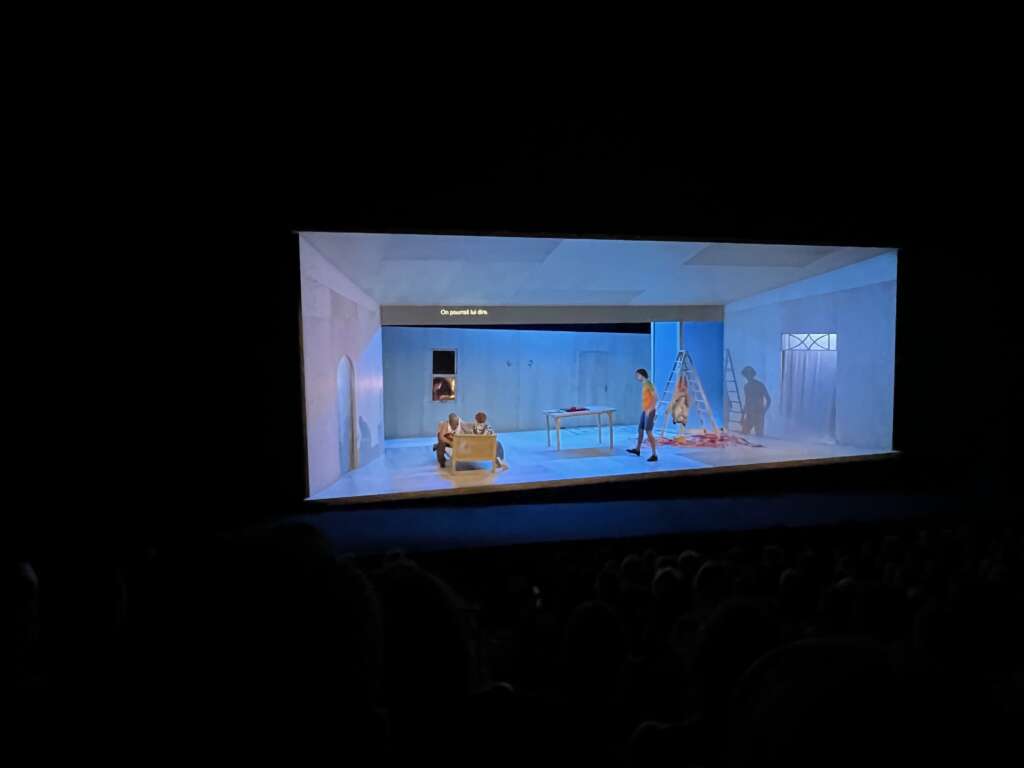
This refusal to resolve runs throughout Mouawad’s oeuvre. In Incendies, the daughter’s journey into her mother’s secret history does not lead to reconciliation but to devastation; in Littoral, the son’s attempt to bury his father collapses into absurd war rituals; in Forêts, genealogy itself is a labyrinth without an exit. Even Seuls, with its hall of mirrors and solitary figure, stages the impossibility of coherent selfhood. Again and again, Mouawad shows how the absence of fathers, of truth, of peace—organises life. Journée de noces may be smaller in scale, but its crooked house belongs to the same architecture of absence: rituals without grooms, families without ground, homes without stability.
This makes Mouawad an heir not only to Beckett but also to Issam Mahfouz, whose The Dictator (1969) staged Lebanese paralysis through grotesque quarrels, and to Roger Assaf’s activist theatre, which insisted on the stage as a mirror to the absurdity of civil war. Lebanese theatre, unlike its mythic music, has always been a theatre of collapse. It could not be otherwise. To write in Lebanon was to write in ruins, to perform amid bombardment. Absurdism was not an imported style but a domestic necessity.
Solidarity of the Shaken
It is here that Jan Patočka’s ghost enters. Mouawad has long spoken of his encounter with the Czech philosopher as decisive, and one sees why. Patočka’s notion of “shakenness,” the collapse of ordinary securities and the confrontation with existence as groundless, is enacted in the play’s every gesture. The crooked house is a state of shakenness made visible. The narcoleptic bride is time refusing coherence. The sheep is ritualistically spoiled in advance. The family’s insistence on staging a wedding amid ruins is not resilience but what Patočka called the “solidarity of the shaken”: a fragile community born not of ideology or nation but of shared exposure to finitude.
Patočka wrote of the “trace,” the absent presence that compels responsibility. Mouawad’s theatre orbits around such traces: lost fathers, silenced mothers, histories disfigured. In Incendies, the dead return not as fullness but as void, reorganising the lives of the living. In Journée de noces, the absent groom is precisely such a trace, structuring the action by his non-appearance. The wedding without a groom is not a failed ritual but a trace made theatrical, an absence turned into presence.
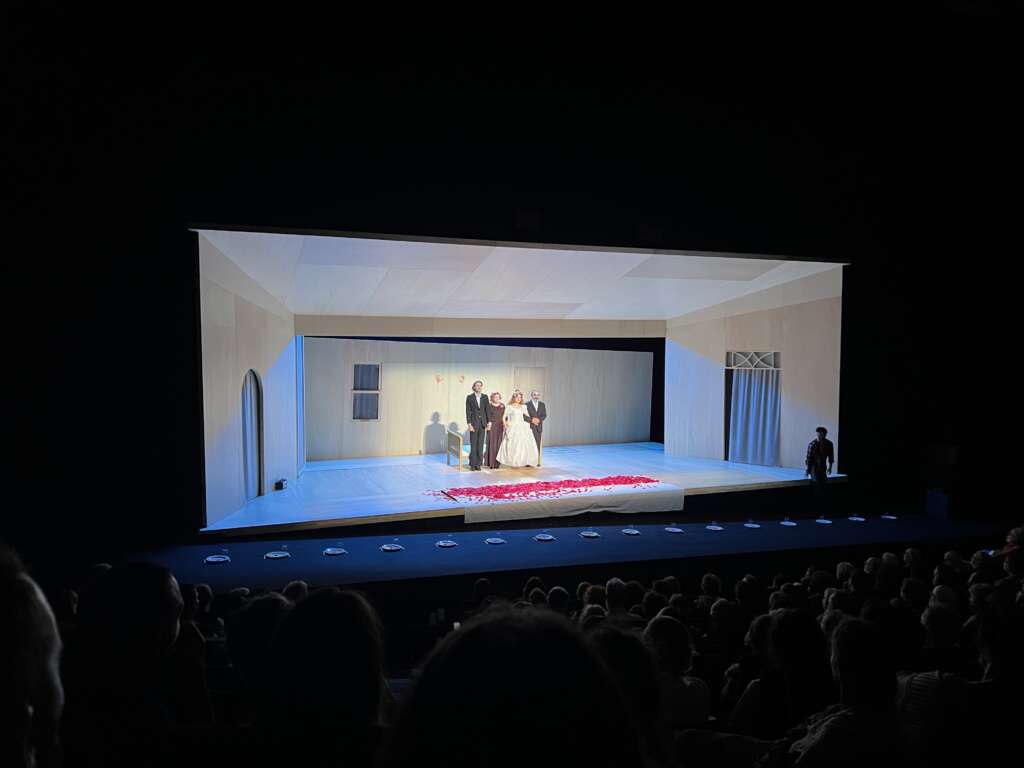
Patočka’s “movements of existence”—acceptance, projection, transcendence—also find their staging here. The family accepts collapse by carrying on the wedding; they project a fantasy of continuity in ritual, and in their absurd performance, they stumble toward transcendence, not as redemption but as bare survival. The play is Patočka dramatised: existence shaken, yet persisting.
The point, though, is not literary genealogy but political condition. Gaza makes this inescapable. The genocide has turned the aphorism into fact. Tomorrow is promised in press releases—ceasefires negotiated, peace plans whispered—but today is filled with rubble. Lebanon, dragged once more into bombardment, knows this temporality too well. The solidarity of the shaken, if it exists, now extends from Gaza’s ruins to Lebanon’s south, from theatres in Paris to WhatsApp messages in Beirut.
Rahbani’s death felt like the closing of one register of Lebanese conscience. His humour, his music, and his aphorisms belonged to a generation that still believed theatre could speak to the nation. Mouawad’s crooked house shows what remains: theatre exiled, subtitled, crooked, yet still staging today. It is not consolation, but it is a form of survival.
As I left the Colline that night, I found myself murmuring Rahbani’s line again. They say tomorrow will be better, but what about today? He meant it in 1978, amid civil war. I heard it in 2025, under the shadow of Gaza. The crooked house had no answer, except the staging itself. To laugh at the absurd wedding, to flinch at the sheep, to watch the bride collapse—that was already an answer. Today is unbearable. And yet today must be staged. That staging, however absurd, is the only survival we have.
